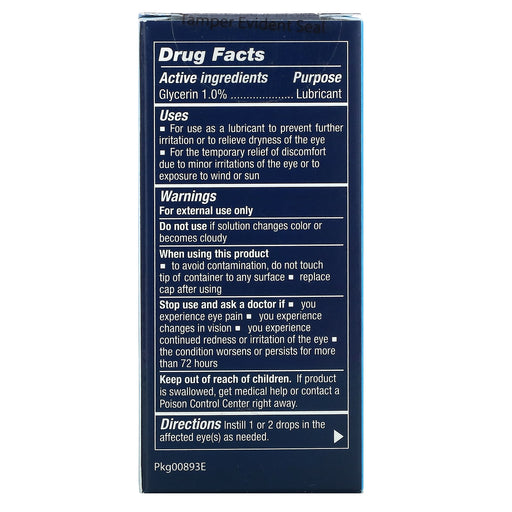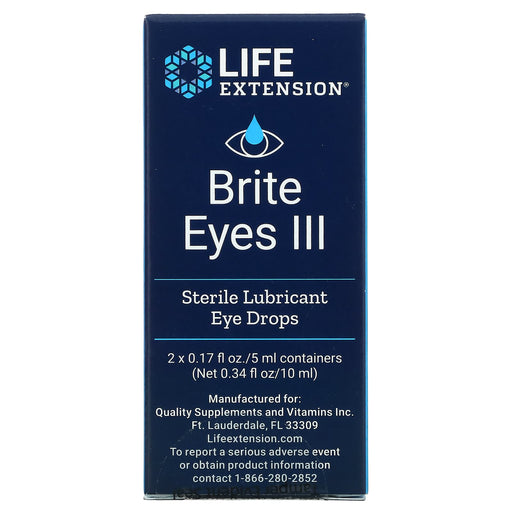
Soothe and Refresh Your Eyes with High-Quality, Nourishing Eye Drops
Dry, irritated, or fatigued eyes can be a common and frustrating problem, especially in today's digital age, where prolonged screen time and artificial lighting can take a toll on our ocular health and comfort. Eye drops offer a simple and effective solution for lubricating, moisturizing, and refreshing the eyes, providing much-needed relief from dryness, itching, and discomfort. By incorporating high-quality, nourishing eye drops into your daily eye care routine, you can help maintain the health and comfort of your eyes, promoting clearer, more refreshed vision throughout the day.
Types of Eye Drops
There are several types of eye drops available, each designed to address specific eye health concerns and provide targeted relief:
- Artificial Tears: These lubricating eye drops are designed to supplement the eye's natural tear production, helping to moisturize and soothe dry, irritated eyes. Artificial tears are available in various formulations, including preservative-free options for those with sensitive eyes.
- Allergy Eye Drops: Formulated to relieve itching, redness, and watering associated with allergic reactions, these eye drops often contain antihistamines or other active ingredients that help reduce inflammation and soothe the eyes.
- Redness-Reducing Eye Drops: These drops work by constricting the blood vessels in the eye, temporarily reducing the appearance of redness and irritation. However, overuse of redness-reducing drops can lead to a "rebound" effect, causing increased redness and dependence on the drops.
- Contact Lens Rewetting Drops: Specifically designed for contact lens wearers, these drops help lubricate and refresh the eyes while wearing contacts, reducing dryness and discomfort.
- Homeopathic Eye Drops: Made from natural ingredients and based on homeopathic principles, these drops aim to stimulate the eye's natural healing processes and provide gentle relief from various eye health concerns.
Choosing the Best Eye Drops for Your Needs
When selecting eye drops, consider the following factors to ensure you are getting a high-quality, effective product that meets your specific eye health needs:
- Ingredients: Look for eye drops that contain nourishing, moisturizing ingredients like hyaluronic acid, glycerin, or natural oils, which help lubricate and protect the eye's surface. If you have sensitive eyes, opt for preservative-free formulas to minimize the risk of irritation.
- Specific Eye Concerns: Choose eye drops that are designed to address your specific eye health issues, such as dryness, allergies, or contact lens-related discomfort.
- Brand Reputation: Select eye drops from reputable brands with a history of producing high-quality, effective eye care products and a commitment to customer satisfaction.
- Doctor Recommendations: If you have a pre-existing eye condition or are unsure which type of eye drops are best for your needs, consult with your eye doctor for personalized recommendations.
Complementing Eye Drops with a Comprehensive Eye Health Routine
While eye drops can provide immediate relief and support for dry, irritated eyes, it's essential to incorporate them into a comprehensive eye health routine for optimal results. Consider the following tips:
- Incorporate Eye Health Supplements: Complement your eye drop use with a comprehensive eye health supplement that provides essential nutrients like vitamin A, vitamin C, vitamin E, zinc, lutein, and zeaxanthin to support long-term ocular health.
- Practice the 20-20-20 Rule: To reduce digital eye strain and dryness, follow the 20-20-20 rule: every 20 minutes, take a 20-second break to focus on an object 20 feet away.
- Maintain Proper Eye Hygiene: Keep your eyes clean and healthy by washing your hands regularly, avoiding touching or rubbing your eyes, and cleaning your contact lenses as directed.
- Stay Hydrated: Drinking plenty of water throughout the day helps support tear production and maintain the health of the eye's surface, reducing the risk of dryness and irritation.
- Use Warm Compresses: Applying a warm compress to your eyes for 5-10 minutes can help stimulate tear production, reduce inflammation, and soothe tired, strained eyes.
In addition to these tips, it's essential to support your eye health from the inside out by consuming a balanced, nutrient-rich diet. Incorporate foods high in eye-supportive vitamins and minerals, such as:
- Vitamin A: Found in foods like sweet potatoes, carrots, and spinach, vitamin A is crucial for maintaining the health of the cornea, retina, and other eye tissues.
- Vitamin C: Citrus fruits, berries, and bell peppers are excellent sources of vitamin C, a potent antioxidant that helps protect the eyes from oxidative damage.
- Vitamin E: Nuts, seeds, and avocados are rich in vitamin E, another powerful antioxidant that works synergistically with vitamin C to support eye health.
- Zinc: Oysters, beef, and pumpkin seeds are good sources of zinc, a mineral essential for the formation of visual pigments in the retina.
- Lutein and Zeaxanthin: Leafy greens, such as kale, spinach, and collard greens, are packed with these two important carotenoids that help protect the macula from harmful blue light and oxidative stress.
- Omega-3 Fatty Acids: Fatty fish, such as salmon, sardines, and mackerel, are rich in omega-3s, which support the structural integrity of the retina and help combat dry eye syndrome.
By combining the use of high-quality eye drops with a comprehensive eye health routine and a balanced, eye-friendly diet, you can effectively support the comfort, clarity, and long-term health of your eyes.
Find Relief and Refreshment with Eye Drops from Health Orchard
Witness the best in soothing, nourishing eye drops with Health Orchard's curated collection. Our selection features a range of high-quality formulas designed to lubricate, moisturize, and refresh dry, irritated eyes, providing much-needed relief and comfort.
From preservative-free artificial tears to targeted drops for allergies and contact lens wear, our eye drops are crafted with nourishing ingredients and backed by reputable brands committed to your ocular health and well-being. With a focus on quality, efficacy, and your unique eye care needs, Health Orchard is your trusted source for the most effective eye drop solutions.
Experience the difference that high-quality eye drops can make in your daily comfort and clarity. Explore our collection today and take a proactive step towards maintaining the health and vitality of your eyes.
Frequently Asked Questions about Eye Drops
1. What are eye drops used for?
Eye drops are used to treat various eye conditions, such as:
- Dry eyes
- Allergies
- Infections (e.g., conjunctivitis)
- Glaucoma
- Inflammation
- Redness and irritation
They can also be used to lubricate the eyes, flush out foreign objects, or deliver medications directly to the eyes.
2. What eye drops are good for running eyes?
For running eyes, which can be caused by allergies or irritation, the following types of eye drops may be helpful:
- Antihistamine eye drops (e.g., ketotifen, olopatadine) to relieve itching and watering caused by allergies
- Artificial tears or lubricating eye drops to soothe irritation and wash away allergens
- Decongestant eye drops (e.g., naphazoline, tetrahydrozoline) to reduce redness and swelling, but these should only be used short-term
3. Is it safe to use eye drops everyday?
The safety of using eye drops every day depends on the type of eye drops and the individual's eye health. Some considerations:
- Artificial tears and lubricating eye drops are generally safe for daily use, as they help maintain eye moisture and relieve dryness
- Prescription eye drops for conditions like glaucoma or infections should be used as directed by an eye doctor
- Overusing certain types of eye drops, such as decongestants, can lead to rebound redness and dependence
It's best to consult with an eye doctor to determine the most appropriate eye drops and frequency of use for your specific needs.
4. Is it OK to use eye drops 4 times a day?
The frequency of eye drop use depends on the type of eye drops and the condition being treated. Some guidelines:
- Most over-the-counter artificial tears and lubricating eye drops can be used up to 4 times a day or as needed for dry eye relief
- Prescription eye drops may have specific instructions for frequency of use, which should be followed closely
- Overusing certain types of eye drops, particularly decongestants, can lead to rebound redness and irritation
If you find yourself needing to use eye drops more than 4 times a day, it's best to consult with an eye doctor to rule out any underlying eye health issues.
5. How many times is OK to use eye drops?
The safe frequency of eye drop use varies depending on the type of eye drops and the individual's eye health. General guidelines:
- Artificial tears and lubricating eye drops can typically be used as needed, up to 4-6 times a day, for dry eye relief
- Prescription eye drops should be used according to the eye doctor's instructions, which may range from once a day to several times a day
- Decongestant eye drops should not be used for more than 3-4 days in a row, as overuse can lead to rebound redness and dependence
If you have concerns about the frequency of your eye drop use, it's best to consult with an eye doctor for personalized guidance.










